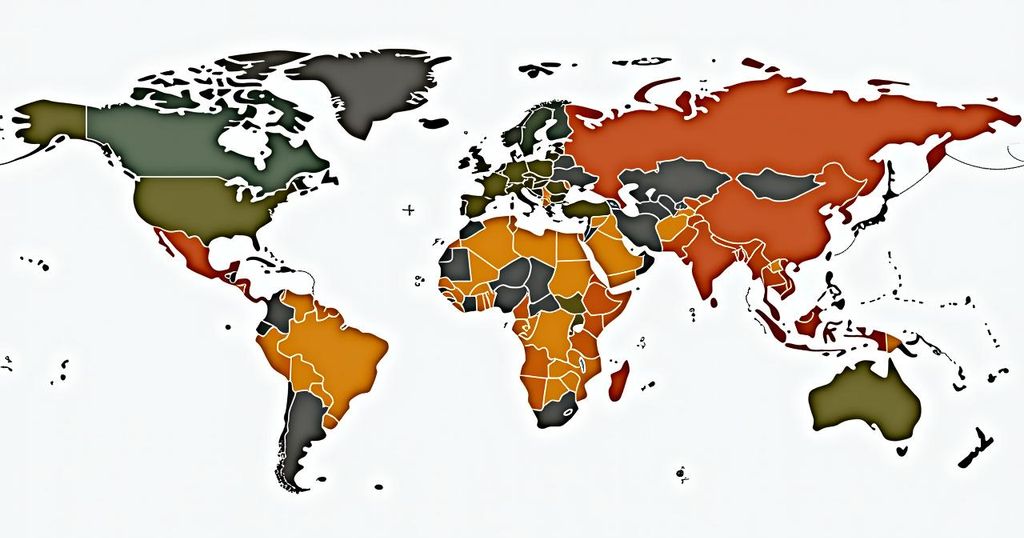A sustainable global universal basic income (UBI) can be achieved through a cap and share system for fossil fuels, providing funds while addressing climate change. Advocated by Pope Francis, the model emphasizes wealth redistribution from the Global North to the Global South. The proposal includes taxation on fossil fuel extraction and wealth, using revenues to support UBI. While immediate benefits of UBI exist, the approach highlights the necessity for sustainable financing and the creation of a Global Commons Fund to ensure long-term viability. This model positions UBI as a tool for both economic and climate justice.
In pursuit of a sustainable global universal basic income (UBI), a model has been devised that integrates a ‘cap and share’ scheme for fossil fuels while simultaneously addressing climate change. This initiative was recently supported by Pope Francis during the World Meeting of Popular Movements, where he urged for the implementation of a global UBI, asserting it embodies both compassion and fairness in the realm of economic justice. The concept of a global UBI extends beyond the alleviation of poverty; it encompasses social justice by rectifying historical inequalities and resource exploitation that have primarily benefited the Global North while leaving the Global South in fiscal distress. Advocates argue that a global UBI would not only eradicate global poverty but would also represent a vital component of wealth redistribution. To address the funding concerns often raised by critics, the nonprofit Equal Right has proposed a detailed financing strategy. Their paper entitled “Climate Justice Without Borders” suggests that a global fossil fuel extraction charge of $135 per tonne could yield approximately $5 trillion annually, sufficient to provide a minimum UBI of $30 per month. Additionally, implementing a progressive wealth tax on the richest individuals could contribute further funding, along with a 0.1 percent financial transactions tax. While an initial monthly payment of around $70 may seem insufficient for many, it holds the potential to transform the lives of the 712 million individuals living in extreme poverty worldwide. Empirical evidence from pilot programs across various countries has demonstrated the substantial benefits of cash assistance, highlighting its capacity to bolster economic security. However, the sustainability of UBI through this model faces limitations as decreasing carbon emissions and wealth distributions could reduce taxable revenue. This underscores the necessity for a more enduring financing solution. In this context, Equal Right proposes the establishment of a Global Commons Fund (GCF), intended to gather revenue from fossil fuel charges, invest in green initiatives, and distribute UBI dividends to citizens. Drawing inspiration from successful sovereign wealth funds, the GCF is projected to become self-sustaining within two decades, contingent upon an initial capital boost from wealthier nations. Moreover, the GCF aims to alleviate the debt burden on impoverished countries while facilitating climate mitigation and adaptation, and it could incentivize countries to restrain fossil fuel extraction through financial support. A crucial aspect of the GCF proposal is the implementation of a carbon extraction cap, aligned with scientific targets to limit global temperature increase to 1.5 degrees Celsius. Under this system, fossil fuel corporations would incur charges for their extraction activities, thus promoting accountability while funding UBI. Furthermore, the UBI itself may play a pivotal role in addressing climate challenges, as evidenced by successful projects in India and Peru, where basic income programs facilitate transitions to cleaner fuel and contribute to conservation efforts. In conclusion, this ‘cap and share’ system not only provides a viable funding mechanism for global UBI but also addresses environmental imperatives, facilitating an essential transformation towards socioeconomic and ecological equity. As global leaders prepare for significant climate discussions, Equal Right underscores the importance of adopting this innovative approach to foster both climate justice and economic fairness. The model stands as a beacon of hope for a more equitable future, presenting pathways towards sustainability amid rising uncertainties.
The discourse surrounding universal basic income has gained momentum in recent years, driven by rising inequalities and the ongoing climate crisis. Advocates of a global UBI contend that consistent cash payments to individuals can alleviate poverty while redistributing wealth from affluent nations to those less fortunate, primarily in the Global South. This push has gained notable support from various sectors, including religious leaders like Pope Francis, who emphasize the moral imperative of such measures. The ongoing debate also encompasses the financial feasibility of UBI and the potential for utilizing revenue generated through environmental taxation, particularly from fossil fuels, to underpin these initiatives amid growing awareness of climate change.
The proposal for a global universal basic income, supported by a robust funding mechanism through fossil fuel taxation and a Global Commons Fund, offers a dual solution to pressing issues of poverty and climate change. This innovative approach not only aims to eradicate impoverishment but also promotes environmental accountability through the careful management of natural resources. As discussions of global climate and economic policies advance, the adoption of the ‘cap and share’ system stands to materially benefit societies worldwide while establishing a more equitable and sustainable future.
Original Source: www.aljazeera.com






